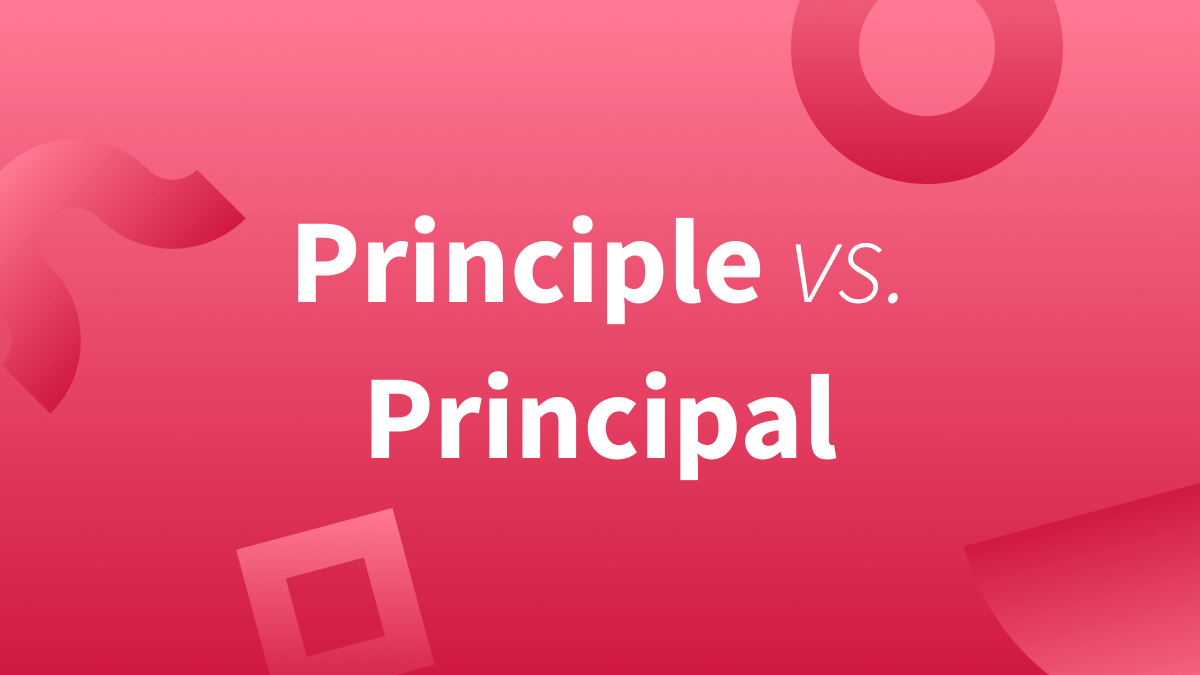What’s the Difference Between “Principal” and “Principle”?
- Principal can function as an adjective that means “most significant” or “main.” As a noun, it refers to someone in an authoritative position or someone who leads a school.
- Principle can only ever function as a noun and means “a moral rule or strong belief that influences your behavior or actions.”
- ○ The constant arguing was the principal reason for our departure.
- ○ Before she became the principal, she was a teacher for 25 years.
- ○ My principles do not allow me to cheat on a test.
Is It “Principal” or “Principle”?
Homophones are one of the principal reasons English can be hard to learn. Really, who’s in charge here? Is there a principal or someone we can talk to? Sometimes it seems like English has no principles.
But it does, and we’re here to help you with even the most irritatingly frustrating parts, like understanding the difference between principal and principle.
How To Spell “Principal”
If you’re wondering how to spell principal of a school, just remember that this person can be your pal, which are the last three letters of this word:
p-r-i-n-c-i-p-a-l.
As a noun, principal refers to someone who oversees a school (in American English) or a college or university (in British and Canadian English).
Principal Jones has been an educator at this institution for over a decade.
The parents love the principal of the school because he is friendly and helpful.
Keep in mind that principal should only be capitalized if it’s part of someone’s title (or if it’s at the beginning of a sentence).

Principal can also refer to anyone who is in a leading position.
Gilbert is the director and principal of the consulting agency.
Lastly, as a noun, principal also refers to the original amount of money invested or lent.
It is advised to leave the principal investment intact, and reinvest the profits made.
Principal can also function as an adjective that means “most important” or “main.”
Surprisingly, the principal ingredient of the dish is cauliflower.
=
Surprisingly, the main ingredient of the dish is cauliflower.
How To Spell “Principle”
Principle, on the other hand, can only ever function as a noun, and also carries a few meanings:
1. “a moral guideline that influences your actions or beliefs”
Her principles didn’t allow her to buy stolen goods.
2. “a fundamental law, rule, or theory”
The principles of physics are ubiquitous.
You may have heard of the expression in principle. This means “as a general idea, but the details haven’t been established or agreed upon.”
We agreed to the trip in principle, but still have to decide on the specifics of the itinerary.
Additionally, if something can be done in principle, then that means that although theoretically, it can be done, it hasn’t happened yet and may not happen due to difficulties or challenges.
In principle, ending world hunger is possible, but it would take an unimaginable amount of effort, dedication, and organization.
Principles of English
We know it’s confusing. Principle vs. principal is commonly searched for online, so just know you aren’t alone in your confusion. Just remember that the main difference between principal and principle is:
- Principal can be used as a noun and adjective, whereas principle can only be used as a noun.
There are other principles of English that people struggle with. Regardless of their complexities, LanguageTool—a multilingual spelling and grammar checker—can help with them all.

